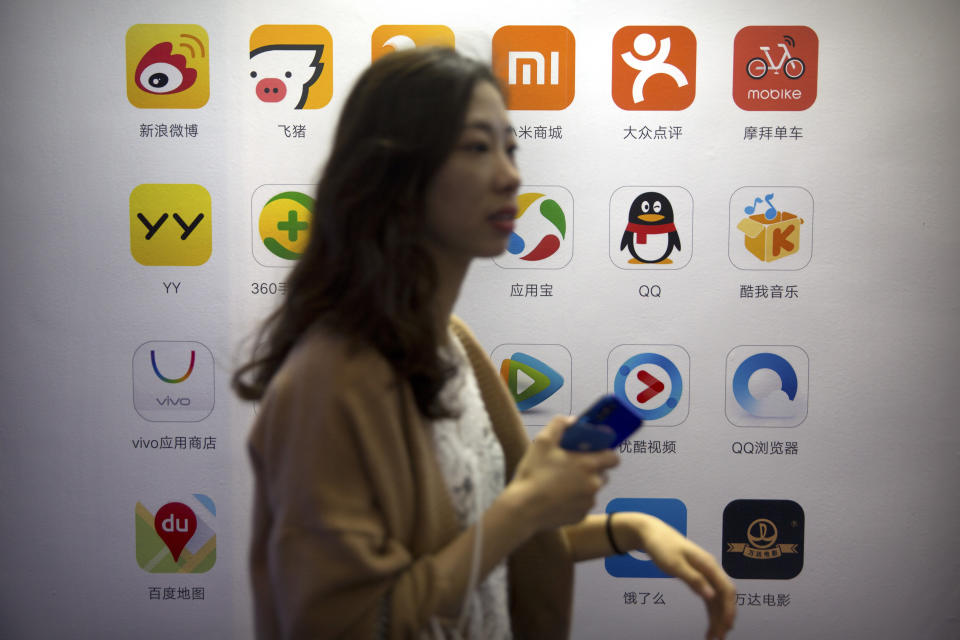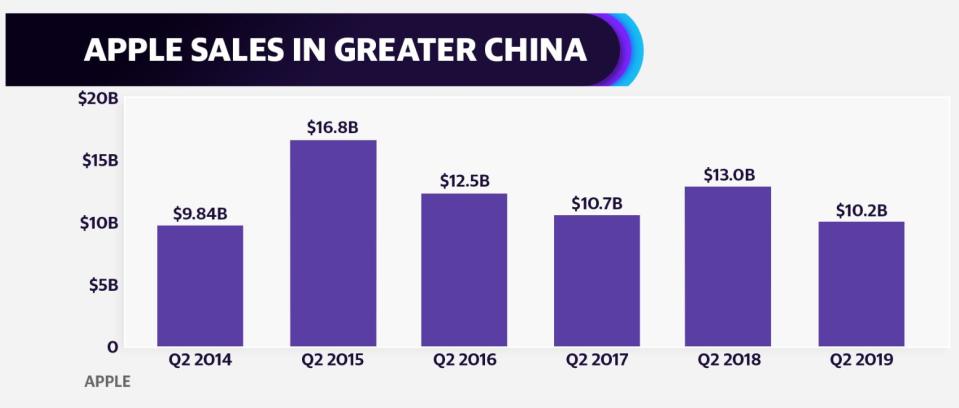Apple’s problem in China is bigger than sluggish iPhone sales
Shu Hao, a graduate student in China, has been an iPhone user since 2014. He hasn’t upgraded his iPhone 7 because he finds new models are too pricey, and the only Apple service he uses is the App Store.
He uses WeChat to talk with friends, read news and pay restaurant bills; he watches videos on iQiyi (IQ) and listens to music on NetEast Cloud Music. He finds the iPhone's native apps like iTunes and iCloud “not user-friendly” and “lack localization.”
Users like Shu in China pose challenges for Apple in a country that was once its fastest-growing market and contributed to one-fifth of its revenue. In China, the iPhone maker has to do more than just battle declining iPhone sales, which surprised investors in January. As it shifts its focus to services-driven growth in the U.S., it will be a lot harder to make services a major revenue stream in China.
It’s hard to generate revenue in China from services

Service offerings have become an essential part of Apple’s focus on its home turf, as it introduced news, game and video offerings and sped up plans to monetize existing services like App Store and iCloud.
Investors are optimistic about the potential. “35% of earnings are services-based and over the next few years, the company is progressively going to start to sell a hardware as a service,” Gene Munster, Loup Ventures managing partner, told Yahoo Finance’s On The Move Wednesday.
But unlike with iPhones, success in the services business is harder to replicate in a market like China, where even Apple’s Silicon Valley peers including Google and Facebook haven’t had much luck.
“The one market in the world where Apple doesn't have its full ecosystem advantage is China, and that's because WeChat has basically been able to encompass everything from pay to games to communication to all these different things. It makes the ecosystem advantage that they have in basically every other market... extremely lower on the value chain,” Ryan Reith, program vice president at IDC, told Yahoo Finance.
WeChat, owned by local giant Tencent, has become the super app with over 1 billion daily active users, who perform daily tasks from messaging to reading, ride-hailing and payment on the platform.
“I don't see them ever getting the service advantage that they see certainly in Western markets, ever in China,” Reith said, referring to Apple.
Extended trade-in offers

On Tuesday, Apple reported a $10.2 billion quarterly revenue in Greater China, down 22% from last year. CEO Tim Cook offered some comfort to analysts by saying the last weeks of the quarter showed an upward trend.
He attributed the improvement to price cuts, trade-in programs and easing China-U.S. trade relations. In the past few months, on its website Apple has lowered the price of newer iPhone models by about 3%, citing tax relief by the government, and offered a trade-in program for smartphone users, which included people who own Huawei and Oppo phones. The trade-in promotion was a limited time offer set to end by January, but was extended several times. Now, Chinese consumers can trade in their old smartphones until the end of June, according to Apple’s website.
But the bottoming out doesn’t necessarily indicate Chinese consumers are going to jump into purchasing new iPhones like they used to, as data from research firms suggest.
The latest report from IDC shows Apple’s worldwide shipment in the first quarter declined by 30.2%. Catalyst data also reveals Apple’s shipment in China has fallen by 30% in the first quarter.
Shipment units tracked by research firms only include new devices, meaning first-time phones in the market, so that does not include refurbished phones in Apple’s trade-in program. Analysts at Bank of America Merrill Lynch believe Apple is offering trade-in values that are at a premium compared to other third-parties, and use them as subsidies to introduce higher priced iPhones.
Will Apple localize its services?
In Chine, as its hardware business is exposed to more competition from local giants like Huawei and Xiaomi, Apple has been struggling to adapt its service offerings to meet local needs.
Government regulation around services like gaming also come into play. Apple’s management has been citing the delay in new game approvals as headwinds for its service revenue in China. But analysts say the slowdown in the overall gaming market could loom beyond just the government policy.
“Mobile game market in China surged in a very short time and the game companies set the game rule quite over rapacious. The players are not playing the game but enjoying the feeling of buying the winning feeling. After that, many games will have no meaning and become boring usually after a certain time,” said Roger Sheng, an analyst at Gartner. Sheng sees average players might just not invest as much as they did in new games.
Fueled by in-app subscription services, iOS consumer spend in non-gaming apps is booming. In the first quarter of 2019, it was up 40% year over year to over $1 billion worldwide, according to App Annie. But Apple may not be in the best position to capture that growth in China.
“This indicates a growing appetite for service offerings,” said Danielle Levitas, an executive vice president of market insights at App Annie. “However, these offerings may need to be tailored to China, as historically, homegrown apps and games that cater to local preferences have seen the greatest success in this market."
Krystal covers tech and China for Yahoo Finance. Write to her via krystalh@yahoofinance.com or follow her on Twitter.
Read more:
Apple cuts iPhone XR price for partner sellers in China
Amazon shuffles thousands of workers in its quest to revamp delivery

